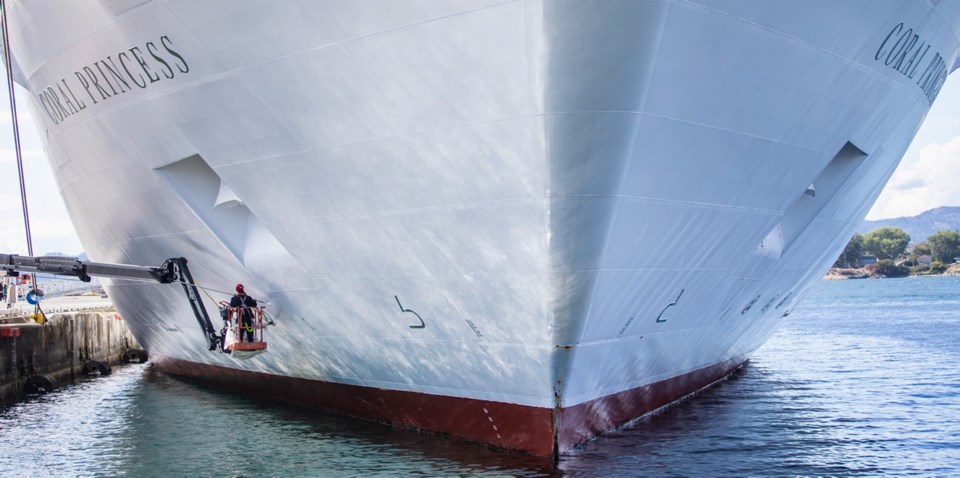Cruise ships that use scrubbers to comply with international sulphur-limit laws may be unintentionally harming endangered whales off the coast of B.C., says a new WWF-commissioned study.
The report, “A whale of a problem? Heavy fuel oil, exhaust gas cleaning systems, and British Columbia’s resident killer whales,” was released by the International Council on Clean Transportation. The study was funded by World Wildlife Fund Canada.
Researchers analyzed 30 commercial ships operating off the coast of B.C. that are equipped with exhaust gas cleaning systems, also called scrubbers, which remove harmful sulphur oxides from exhaust gases of heavy fuel oil used in marine engines.
Open-looped scrubbers, the most commonly used system, dispose a mix of water and contaminants in the ocean called wash water. The wash water has “carcinogenic substances such as polycyclic aromatic hydrocarbons (PAHs) and heavy metals,” said the report. There are no federal laws about ships operating in “open” mode, and the report is calling for legislation to eliminate open-looped scrubbers.
The report found the 30 ships studied in 2017 emitted 35 million tonnes of scrubber wastewater off the B.C. coast, including in areas where there are endangered species of killer whales.
Cruise ships were responsible for 90 per cent of these discharges, according to the study.
Of the 30 ships with scrubbers installed, 16 had open-loop scrubbers and 14 had a hybrid of open and closed-loop scrubbers.
The report notes that it is possible that some ship operators sometimes voluntarily operate in closed-loop mode, which collects the slurry waste to be disposed of on land. The researchers say that the reason ship operators may not use closed-loop mode is because it is more expensive. While more than 50 per cent of ships in the study use open-looped scrubbers, the researchers predict this could grow by 35 per cent in 2020, and that cruise ships could account for two-thirds of this increase.
Southern resident killer whales are endangered, with only 76 individuals remaining, and northern resident killer whales are threatened with 309 animals remaining. The whales are under an enormous amount of stress from dwindling food sources caused by climate change, and Hussein Alidina, lead specialist of oceans with WWF-Canada. Discharge from ships may be adding to their stress, Alidina said.
“Pollution and contamination from all sources, including shipping, need to be reduced for long-term recovery of this population to be possible,” he said.
Researcher say PAHs are stored in killer whale’s fat reserves, and can cause cancer and other health problems.
Alidina said the recovery strategy for the resident killer whales recognizes that these chemicals being released may be another factor contributing to mortality.
“The metals accumulate in the liver, and the marrow, and kidneys,” he said, as well they are being passed on to calves from mother’s milk.
“I think the situation with the residents is that there are multiple threats. The lack of food, the noise, the disturbance, the toxic contamination, they are facing death by a thousand cuts, and here is another thing we are exposing them to,” he said, adding more studies are need to show how much of an effect the wash water is having on the whales.
WWF Canada said transitioning away from heavy oil to fuels that don’t require scrubbers will eliminate this threat and help set a course for zero-emission shipping by 2050. Other findings from the report include that 90 per cent of ships carrying heavy fuel oil in B.C. pass through killer whale habitat, and that several coastal states and ports have banned open-loop scrubber discharge, including California, China and, most recently, Malaysia.
Singapore and Fujairah, in the UAE, will ban discharges starting in 2020, the report states.
Companies have been installing scrubbers because in 2020 the International Maritime Organization will begin enforcing a fuel sulphur limit of 0.5% by mass, down from a limit of 3.5 %. The report says many companies have switched to scrubbers to comply with regulations without having to switch to cleaner, more expensive fuels.
Media spokespeople for Carnival and Princess cruise lines, named in the report as using open-looped systems in B.C., did not immediately reply to messages seeking comment.
Transport Canada has also been contacted about whether it is reviewing current legislation concerning scrubbers.



